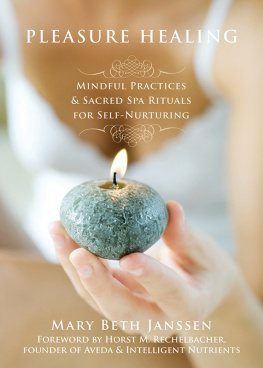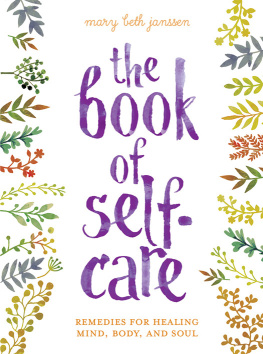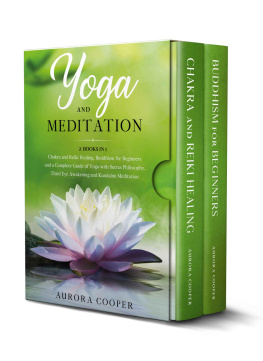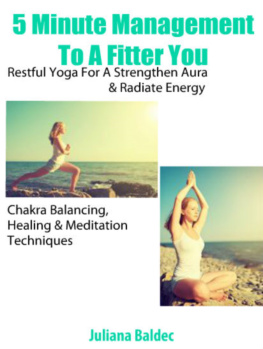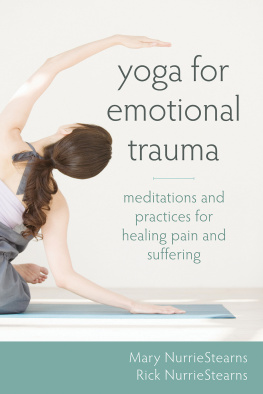Acknowledgments
Id like to thank all my friends at New Harbinger for their belief in and support of my message. To Wendy Millstine for our serendipitous connection. To Jess OBrien and the many others who helped to bring this book to fruition, giving it a beautiful look and feel. And my utmost gratitude to Jess Beebe and Nelda Street for your inspired editorial guidance.
My deep appreciation to dear friends and mentors alike for your inspiration, support and guidance especially Horst M. Rechelbacher, Deepak Chopra, M.D., David Simon, M.D., Max Simon, Gay Hendricks, Ph.D, Deborah Szekely, Candace Pert, Ph.D, Herbert Benson, M.D., Samuel Epstein, M.D., Mary Bemis, Beverly Maloney-Fischback, Julia Fenster, Rod Stryker, Ram Dass, Arielle Ford, Joseph Mercola, D.O., Francis Moore Lapp and Anna Lapp, Gabrielle Roth, Ronnie Cummins, Kenny Ausubel and Nina Simons, Ted Ning, Marnie Morrione, Bianca Alexander.
And to the wise women, or shall I say goddesses, in my life Bea Sochor, Vi Nelson, Leslie Pace, Susan Macleary, Mary Atherton, Judy Rambert, Marsha Engle, Lynn Maestro, Christie Phillips, Janet Gordon, Kathleen Bucci Bergeron and Cynthia Zahn.
And finally, thanks to all my fellow seekers who are looking to infuse your lives with peace, joy and love. And striving to live a more simple, natural, and organic lifestyleone thats in tune with nature, and thus spirit.

Chapter 1

Embracing Mindfulness
When Buddha was asked, What do you and your disciples practice? he answered, We sit, we walk, we eat. Perplexed, the questioner inquired, Doesnt everyone sit, walk, and eat? Yes, replied Buddha, but when we sit, we know we are sitting. When we walk, we know we are walking. When we eat, we know we are eating. This is the essence of mindfulness in our livesthe nonjudgmental awareness, or witnessing, of the moment and our place in it, also referred to as paying attention on purpose. Heaven is indeed here on earth in the myriad ways we devote our spirits to the minutiae of our daily lives. By integrating the two worlds, we find wholeness. When exquisitely mindful, we become extremely aware of the spiritual nature of the material world. More tuned-in, we begin to see spirit everywhere and in everything. In this state of being, we seek the spiritual root of any problem and channel our energy to heal it. Its all inside; if youre ready to do this work, spirit awaits you.
Whether youre eating a meal, washing dishes, brushing your teeth, making love, sitting in a traffic jam, or caring for an ailing loved one, be mindful of every nuance of the experience. Become the witness, consciously observing spirit. Be present in this moment, right here, right now. Watch yourself reading these words and reflecting on them.
Stop resisting life; let moments arise as they are, without labeling them. When youre not mindful, life is less satisfying; youre usually somewhere else, striving for whats missing, but in fact, youre whats missing. Imagine being with a group of friends at a beautiful sunset. Everyone except you drinks in the glorious view. Rather than enjoy the sunset, you let the moments richness pass you by. In a balanced life, mindfulness prevents the moments that are the fabric of our lives from going by in a blur. Rather, we learn to savor them, much the way we did as children, when the days seemed long.
When youre fully present as each moment unfolds, your life changes dramatically, with the potential to become vibrant and electrifying beyond compare. We see the fullness of what is, rather than whats lacking. Now lets be honest; if we reflect on it, any one of us could find a number of annoyances in our daily lives. Its how you allow them to affect you that matters. When youre fully present, accepting and living a life of joy, you can shrug or laugh them off. Individuals at a crossroads see them as a blueprint for change, whereas those who are out of touch with spirit, depressed, or anxious just skid on them into a ditch. Being fully present conveys the knowledge to make choices about stressful situations. And importantly, if the problem cant be solved, you can change your perception or learn better coping skills. Yes, mindfulness encourages you to consciously work with your own stress, pain, illness, and everyday challenges instead of simply stuffing them.
We may be distracted by the persistent needs of the ego: the need for power, control, and approval. Spirit doesnt have any of these needs. Spirit just is, right now, in this moment. This is the real you. Mindfulness connects you to spirit, and when it does, you make the most life-affirming choices for yourself rather than those from learned habits or physical needs. For example, consider how you wake up. Do you bolt out of bed and stumble to the shower, barely aware of the time, date, or century? To witness your own morning and nurture your life-force energy, wake up slowly. Make awakening a delightful ritual. Do a bit of yoga (even in bed!), enjoy a moment of meditation, practice self-massage, step in the shower, and become one with the water. As you move through your day, greet people in a nonjudgmental and compassionate way. Compassion is a word youll see throughout this book. Compassion is a practiceand the ultimate sign of emotional maturity. In yoga we speak of ahimsa, or noninjury, as one of the most important practices for living joyfully and developing universal love. Ahimsa is refraining from causing pain to any living creature. So it is also with compassion, which calls upon us to be kind from the awareness that everyone carries some form of burden.
One of my mentors, Deepak Chopra, has said in many of his seminars, Were all doing the best we can from the level of consciousness were in. Everyones level of consciousness differs depending on life circumstances. When you try to understand where someone is coming from, you automatically become less judgmental. As you become less judgmental, you become more tolerant; when more tolerant, youre better able to forgive. And when you can forgive, you have the capacity to love unconditionally. Compassion creates a remarkable chain of positive energy that results in the most radiant well-being possible.
Pleasure-Healing Ritual: Housecleaning
To celebrate life in such a broad, unprejudiced manner, many of us may need to consider a little emotional cleansing and a few attitude changes. Its important to understand that much of our stress is relative to our perception of a given situation. When you learn how to change your perception of, or emotional attitude toward, stressful situations, you remove their ability to negatively affect you. Im not suggesting that you try to bypass painful or uncomfortable feelings; we need to fully sit with these emotions and listen to them. But its how we process them that truly matters.
To begin the cleansing process, try observing your emotions. Begin simply, by looking at one emotion thats at the top of your mind today. Commit to taking full responsibility for the emotion. Its quite easy to place the blame elsewhere for our anger, sadness, or bitterness, when these are, in fact, our feelings; we create them as readily as we diffuse them. Identify the sensations that the emotion creates in your body. Verbalize or write down how the emotion makes you feel. What can this emotion teach you about yourself? What needs do you have that are unmet? Have the intention to clearly define this, and work toward resolving the unmet need. Now release the emotion and consciously celebrate this release. The emotion no longer controls you, but you control it! If this technique seems overwhelming, ask a friend or loved one for support, or consider getting professional help. Talking to someone who is removed from your stressful situation can bring tremendous relief, renewal, and even rebirth.

